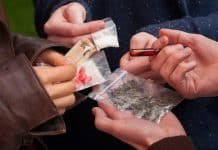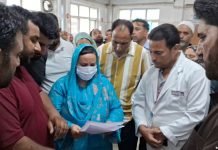
SRINAGAR — The majority of women in Jammu and Kashmir are anaemic, said statistics published in the latest ‘Women and Men in India 2022’ report by the Ministry of Statistics and Programme Implementation (MoSPI).
According to the report released recently, 66 percent women in Jammu & Kashmir have anaemia, including 25 percent with mild anaemia, 38 percent with moderate anaemia, and 3 percent with severe anaemia. “Anaemia is particularly high among rural women, women aged 15-19, and other backward class women, but anaemia exceeds 40 percent for every group of women.”
As per the report, during NFHS-4, 49 percent non-pregnant women aged between 15-49 were anaemic, which has increased to 67.3 percent during NFHS-5. However, slight improvement has been in the anaemic condition of pregnant women aged 15-49. During NFHS-4, 46.9 percent women were found anaemic while during NFHS-5, 44.1 percent women were found anaemic.
Overall, the anaemic condition of all women aged 15-49 has increased from 48.9 percent in NFHS-4 to 65.9 percent in NFHS-5.
Notably, anaemia is a condition that is marked by low levels of haemoglobin in the blood. Iron deficiency is estimated to be responsible for about half of all anaemia globally. Still, anaemia can also be caused by malaria, hookworms, other nutritional deficiencies, chronic infections and genetic conditions.
Moreover, anaemia can result in maternal mortality, weakness, diminished physical and mental capacity, increased morbidity from infectious diseases, prenatal mortality, premature delivery, low birth weight, and in children, impaired cognitive performance, motor development, and scholastic achievement.
Furthermore, anaemia is a major health problem in Jammu & Kashmir, especially among women and children.
Several doctors, while talking to the news agency KNO, said diet is playing an important role in this regard as most women aren’t eating nutrient-rich diets.
Dr Sabeena, a gynaecologist at SDH Bijbehara, said that a lack of nutrition diversity in meals — inclusion of quality sources of proteins, micronutrients in households is one of the main reasons behind anaemia. “In women of reproductive age, heavy periods and pregnancy are the most common causes of iron deficiency anaemia as their body needs extra iron for their baby during pregnancy,” she said.
She further said that if iron deficiency anaemia is left untreated, it can make you more susceptible to illness and infection, as a lack of iron affects the body’s natural defence system (the immune system).
Dr Rakshanda, another gynaecologist, said that iron deficiency is common in a Kashmiri person’s daily diet, as people here usually overcook the vegetables. “As a result, the nutrients are lost,” she said.
“Even pregnant women who have access to iron tablets often don’t take them because they feel uncomfortable or nauseated – common side effects of pregnancy,” she said, adding that in far-off places, women don’t have access to these things due to poverty and other issues.
“The reason for rising cases of anaemia is a lack of awareness, lack of education regarding dietary habits, nutritional deficiencies, and ignorance of menstrual health,” she said.
She went on to state that anaemia is a major public health problem, especially in reproductive-age women, because of their high demand for iron.
Follow Us
The Kashmir Pulse is now on Google News. Subscribe our Telegram channel and Follow our WhatsApp channel for timely news updates!










